Moroccan Arabic (Darija) is known to be one of the hardest Arabic dialects for even Arabic speakers of the Middle East. Still, I know many non-Arabic speakers who speak Darija well without even knowing Modern Standard Arabic (MSA), so that’s why a native Darija speaker (me) asked some of his foreign friends who are interested in Moroccan Arabic for help to make this beginner’s guide.
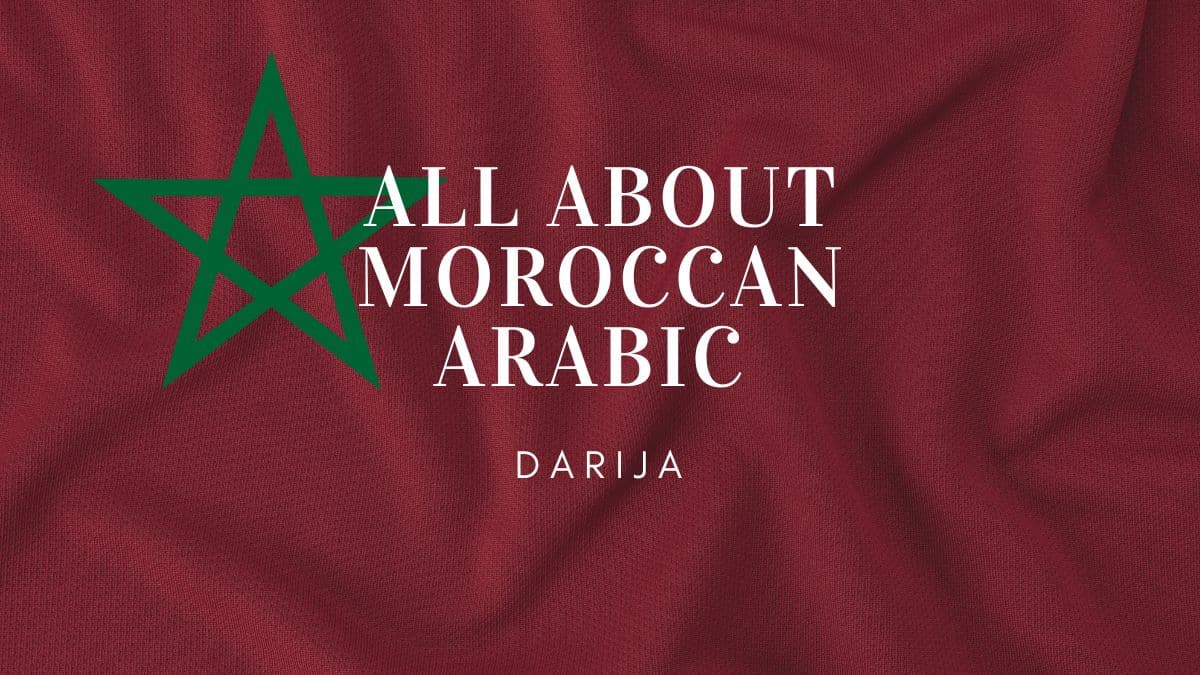
Getting Started: Your First Darija Words And Phrases:
Due to the geolocation of Morocco and its interaction with many countries, Darija has a good amount of loan words coming from French, Spanish, and Amazigh (the native language), this makes the dialect richer, and you may recognize some words as you go through this guide.
Also, we will be using the Latin alphabet alongside the Arabic one, so both those who know the Arabic alphabet and those who don’t will benefit from this guide adding to that some numbers to represent some special Arabic letters:
- 9 for ق
- 3 for ع
- 7 for ح
- 5 (or kh) for خ
Basic Darija Greetings
To greet someone in Darija you would say assalam 3alikum (peace be upon you السلام عليكم), to answer it use wa 3alikum assalam و عليكم السلام, you can also greet with ahlan (hello أهلا), and simply say it back if it’s said to you, you won’t find anyone in Morocco saying only Assalam 3alikum or ahlan without asking about you:
AUDIO:
Kidayer? (how are you? كيداير؟)
Labas 3lik? (how are you? لباس عليك؟)
Bikhir? (bi5ir) good? بخير؟
Kolshi mzyan? (is everything alright? كلشي مزيان؟)
Some will tell you the whole Kidayer labas 3lik bikhir kolshi mzyan? as a way of saying (how are you?) Wow haha.
Don’t be surprised if someone asks you about your health and parents too lol:
Kidayra s7i7a? (how’s health? كيدايرا الصحيحة؟)
Kidayrin lwalidin? (how are your parents? كيدايرين الوالدين؟)
Kib9aw walidik? (how are your parents right now? if you knew they were sick كيبقاو والديك؟)
Lwlidat? (the kids? لوليدات؟)
Mwalin dar bikhir? (are the house owners well? house owner: basically everyone living in your house موالين الدار بخير؟)
Now how to answer: ana bikhir/ labas (I’m good أنا بخير/ لباس) or simply bikhir/labas, and to be polite ask back: wnta/wnti? (and you? wnta if you’re addressing a male, wnti for female ونتا/ونتي)
If you want to say “not that good”: shwiya شوية (literally means “a little”)
Aaaand in any case, good or bad, Moroccans say lhamdulillah الحمد لله (literally: thank God)
You can end a conversation with Bslama (see you later بسلامة) and add T’halla/T’hallay frasek (take care of yourself, for male and female in order تهلا/تهلاي فراسك), to respond, just say it back.
Note: you can practice what you’ve learned here, and learn how to pronounce each of the words in our Memrise course here, don’t know how to use the platform or sign up? we’ve got you covered in this easy-to-follow tutorial here.
Can you imagine that this is a discussion in Darija, using only one word?:
- Labas?
- Labas, labas?
- Labas, labas
Now let’s see if you can understand this short dialogue:
1 – assalam 3alikum, kidayer labas 3lik? السلام عليكم، كيداير لباس عليك؟
2 – wa 3alikum salam, lhamdulillah labas wnta bikhir? kolshi mzyan? وعليكم السلام، الحمد لله لباس ونتا بخير؟ كلشي مزيان؟
3 – lhamdulillah kolshi mzyan, kib9aw walidik? الحمد لله كلشي مزيان، كيبقاو والديك؟
4 – shwiya lhamdulillah شوية الحمد لله
5 – Bslama
6 – Bslama, thalla frasek
Related post: Greetings In Moroccan Arabic
See you’re greeting in Darija already! Congratulations! How about celebrating with a cup of tea with mint? Kas datay b n3na3 كاس دآتاي بالنعناع.
Introducing Yourself
Now that we have greeted each other and had our first kas datay, it’s time to tell me about yourself, you can do this using the following sentences:
Smiti…. (my name is ….. سميتي)
Ana men ….. ( I’m from….. أنا من)
Shnu smitek? (What’s your name? شنو سميتك؟)
Mnin nta/nti? (where are you from? منين نتا/نتي؟) nta/nti: for male/female
Here are some countries in Darija (if you don’t find your country tell me in the comments, more about countries and nationalities here in this post, you can also use the word in English, just don’t stop!)
- Maghrib (Morocco المغرب)
- Holanda (The Netherlands هولندا)
- Almanya (Germany ألمانيا)
- Beljika (Belgium بلجيكا)
- Fransa (France فرنسا)
- Spanya (Spain سبانيا)
- Merikan (USA ميريكان)
- Canada (Canada كندا)
- Swisra (Switzerland سويسرا)
- Brazil (Brazil البرازيل)
- Rusya (Russia روسيا)
- Chinwa (China الشينوا)
- Iran (Iran إيران)
- Italya (Italy إيطاليا)
- Ngliz (England النجليز)
- Turkya (Turkey تركيا)
So, I would introduce myself as:
Smiti Oualid, ana men maghrib, I can also say: Ana Oualid (Ana is the pronoun I أنا) notice that we didn’t use the verb “to be”?
Here are some other words to help you say longer sentences:
- Mdina (City مدينة)
- Blasa (Place بلاصة)
- Dawla (Country دولة)
- F (In فْ)
- Zwina (beautiful زوينة)
Smiti Oualid, ana men Nador, mdina zwina fel maghrib (My name is Oualid, I’m from Nador, a beautiful city in Morocco سميتي وليد، أنا من الناظور، مدينة زوينة فالمغرب)
Related post: How to introduce yourself in Darija
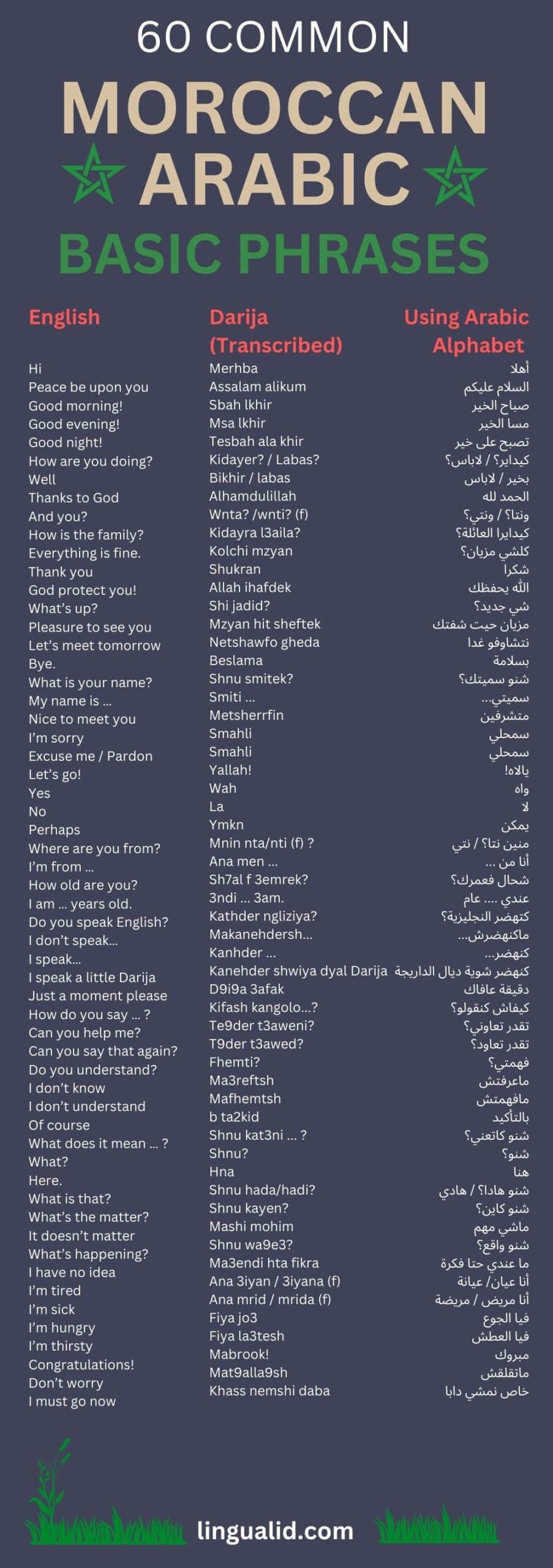
Useful Darija Words
This list is provided with the help of my Swiss friend Zofia (Shukran!):
Besse7a (bon appetite! بالصحة)
Allah y3tik sa7a (Lit. God give you health, response to besse7a الله يعطيك الصحة)
Lyoum (today اليوم)
Daba (Now دابا)
Atay (tea أتاي)
Atay msha7ar (very well done tea أتاي مشحر)
Shuf (look شوف)
Ana (I/me أنا)
Nta (you/male نتا)
Nti (you/female نتي)
Huma (they هوما)
7na (we/us حنا)
Shi (something شي)
Ta7t (below تحت)
Fo9 (above فوق)
Hna (here هنا)
Lmakla (the food الماكلة)
Finek? ( where are you? فينك؟)
Imta ghadin? (when are we going? إمتا غادين؟)
Safi/Baraka (enough! صافي/بركة)
3afak (please عافاك)
Bezzaf (a lot/many بزاف) Actually we use this word literally Bezzaf!
Fhemt (I understand فهمت)
Mafhemtch (I didn’t understand مافهمتش)
Shwiya (a little bit شوية)
Sghir/sghira (small صغير)
Kbir/kbira (big كبير)
Sma7li (excuse me سمحلي)
Walakin (but ولكن)
7it (because حيت)
Ymken (possibly يمكن)
Hakka (like this هكا)
Fo9ash/imta? (when? فوقاش/إمتا؟)
Kifash? (how? كيفاش؟)
3lash? (why? علاش؟)
Fin? (where? فين؟)
Shukran (thank you شكرا)
3lash la (why not علاش لا)
Aji (come آجي)
Sir (go سير)
Mal hada/hadi? (what’s wrong with him/her? مال هدا/هدي؟)
3aref/3arfa (I know عارف/عارفة)
Dyali (mine ديالي)
Dyalek (yours ديالك)
Wah (yes واه)
La (no لا)
Mashi daba (not now ماشي دابا)
Wakha (okay واخا)
Related: most common nouns in Darija
Basic Darija Survival Phrases
Here are a few Darija survival phrases to help you express yourself:
Fiya ju3 (I’m hungry فيا الجوع)
Fiya l3tash (I’m thirsty فيا العطش)
Mafhemtsh (I don’t understand مافهمتش)
T9der t3awed shnu gelti? (can you repeat what you said? تقدر تعاود شنو قلتي؟)
Kathder b zerba (you’re speaking quickly كاتهضر بالزربة)
T9der tahdar b shwiya 3afak? (can you speak slowly, please? تقدر تهضر بشوية عافاك؟)
Daba fhemtek (now I understand you دابا فهمتك)
Fin toilette? (where is the bathroom? فين الطواليط؟)
Sh7al hadi? (how much is this? شحال هادي؟)
Sh7al sa3a? (what time is it? شحال الساعة؟)
Katahdar ngliziya? (do you speak English? كاتهضر الانجليزية؟)
Kanehder shwiya dyal darija (I speak a little bit of darija كانهضر شوية ديال الدارجة؟)
Makanhdersh fransawiya (I don’t speak French ماكنهضرش الفرنساوية؟)
Shnu hiya …..? (what is …..? شنو هيا…….؟)
Numbers
One (1) Wah7ed واحد
Two (2) juj جوج
Three (3) tlata تلاتة
Four (4) rb3a ربعة
Five (5) 5msa (khmsa) خمسة
Six (6) setta ستة
Seven (7) sb3a سبعة
Eight (8) tmnya تمنية
Nine (9) ts3a تسعة
Ten (10) 3shra عشرة
Eleven (11) 7dash حداش
Twelve (12) tnash طناش
Thirteen ( 13) tlattash تلطاش
Fourteen (14) rb3tach ربعطاش
Fifteen (15) 5mstash (khmstash) خمسطاش
Sixteen (16) settash سطاش
Seventeen (17) sb3tash سبعطاش
Eighteen (18) tmntash تمنطاش
Nineteen (19) ts3tash تسعطاش
Twenty (20) 3shrin عشرين
From now on, you’ll find that things are similar to German, as we say (one and twenty) wa7ed w 3shrin to say 21, the only difference here is that for 22, we don’t say (juj w 3shrin) but we use tnin instead of juj: tnin w 3shrin, same will apply to the others (e.g 32: tnin w tlatin)
Twenty one (21) wa7ed w3shrin واحد و عشرين
Twenty two (22) tnin w 3shrin تنين و عشرين
Twenty three (23) tlata w 3shrin تلاتة و عشرين
Thirty (30) tlatin تلاتين
Fourty (40) rb3in ربعين
Fifty (50) 5msin خمسين
Sixty (60) settin ستين
Seventy (70) sb3in سبعين
Eighty (80) tmanin تمانين
Ninety (90) ts3in تسعين
One hundred (100) mya مية
Now try saying your age in Darija in the comments below, don’t cheat lol.
More about numbers in this detailed post.
Moroccan Arabic (Darija): Beginner’s Guide Review
Glossary of Key Terms
- Darija: The colloquial language spoken in Morocco, differing significantly from Modern Standard Arabic (MSA).
- Assalam 3alikum: The standard Arabic greeting meaning “peace be upon you.” The response is “wa 3alikum assalam.”
- Ahlan: A more informal greeting meaning “hello.”
- Kidayer/Labas: Common ways to inquire “how are you?”
- Bikhir: Meaning “good,” it’s used in greetings and responses like “I’m good.”
- Kolshi mzyan?: A phrase asking “Is everything alright?”
- Shwiya: Meaning “a little,” used to express something is “not that good.”
- Lhamdulillah: An expression of gratitude meaning “thank God.”
- Bslama: A farewell similar to “see you later.”
- T’halla/T’hallay frasek: A phrase meaning “take care of yourself” directed to males/females respectively.
- Kas datay b n3na3: A beloved Moroccan beverage, “tea with mint.”
- Smiti…. : A phrase meaning “My name is…”
- Ana men….: Meaning “I am from…”
- Shnu smitek?: A question asking “What’s your name?”
- Mnin nta/nti?: A question asking “Where are you from?” directed to males/females respectively.
- Besse7a: An expression wishing “bon appetit!”
- Allah y3tik sa7a: A response to “Besse7a,” literally meaning “God give you health.”
- Safi/Baraka: Exclamations meaning “enough!”
- 3afak: A polite term meaning “please.”
- Bezzaf: An adverb meaning “a lot” or “many.”
- Fhemt/Mafhemtch: Phrases stating “I understand/I don’t understand” respectively.
- Sma7li: An apology meaning “excuse me.”
- Wakha: A versatile term expressing agreement like “okay.”
- Fiya ju3/ l3tash: Phrases expressing “I’m hungry/thirsty” respectively.
- Sh7al hadi?/ sa3a?: Questions asking “How much is this?/What time is it?” respectively.
Quiz
Instructions: Answer the following questions in 2-3 sentences based on the provided text.
- What is the significance of loan words in Darija?
- Explain the typical structure of a greeting exchange in Darija.
- What are two ways to say “I’m good” in Darija?
- What is unique about the pronunciation of numbers 22-29 in Darija?
- How would you introduce yourself with your name and nationality in Darija?
- What are two useful phrases to express a lack of understanding in Darija?
- What is the literal translation of “Allah y3tik sa7a,” and when is it used?
- What are two ways to express gratitude in Darija?
- What is the significance of using “nta” or “nti” in Darija?
- List three phrases you could use in a basic conversation about food or drink in Darija.
Answer Key
- Loan words from French, Spanish, and Amazigh enrich Darija’s vocabulary and reflect Morocco’s geographical location and interactions with other cultures.
- Greetings in Darija extend beyond a simple “hello.” They typically involve inquiries about well-being, family, and sometimes even health, making them more engaging and personal.
- You can say “Ana bikhir/labas” or simply “bikhir/labas” to express “I’m good” in Darija.
- Unlike other numbers, 22-29 in Darija use “tnin” instead of “juj” for the “two” component, such as “tnin w 3shrin” for 22.
- You would introduce yourself by saying, “Smiti [Your Name], ana men [Your Country]” (My name is [Your Name], I am from [Your Country]).
- “Mafhemtsh” (“I don’t understand”) and “T9der t3awed shnu gelti?” (“Can you repeat what you said?”) are useful phrases to express a lack of understanding.
- “Allah y3tik sa7a” literally translates to “God give you health” and is a common response to “Besse7a” (“Bon appetit”).
- “Shukran” (“Thank you”) and “Lhamdulillah” (“Thank God”) are two ways to express gratitude in Darija.
- “Nta” and “nti” are essential pronouns for addressing males and females respectively, reflecting the gender distinction in Darija grammar.
- “Fiya ju3” (“I’m hungry”), “Fiya l3tash” (“I’m thirsty”), and “Kas datay b n3na3” (“Tea with mint”) are examples of phrases you could use in basic food and drink conversations.
W daba?
Now that you speak some Darija, using this friendly guide to Moroccan Arabic, you can celebrate yourself, surprise your Moroccan friends, and try to use language exchange apps to practice with Moroccans, you will find people who are learning your language for sure, or wait! you can always connect with me through my social channels and tell me about your progress, you’re more than welcome!
More Darija content is coming! Keep learning!
This is an introductory post about Moroccan Arabic, continue learning it with us here.
Oualid Cheddadi is a language enthusiast who created Lingualid with the mission to inspire independent language learners worldwide, regardless of the language they are learning. The name “Lingualid” is derived from the Portuguese word for “language,” “língua,” and the last three letters of Oualid’s name, “Lid.”

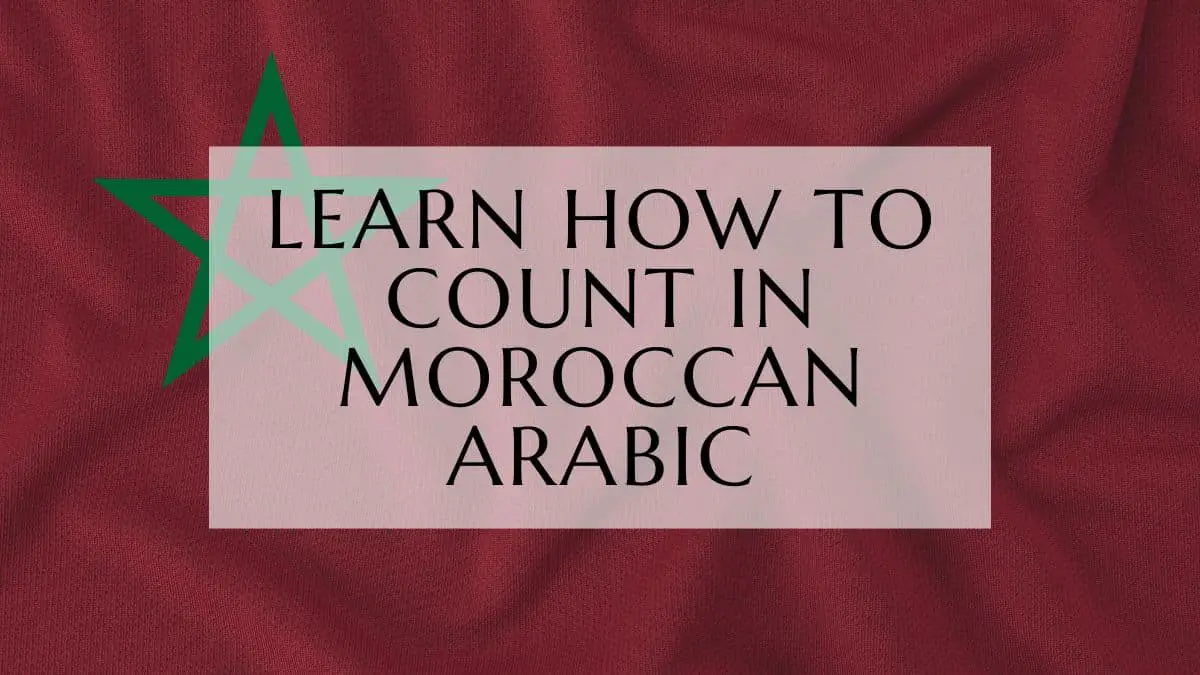
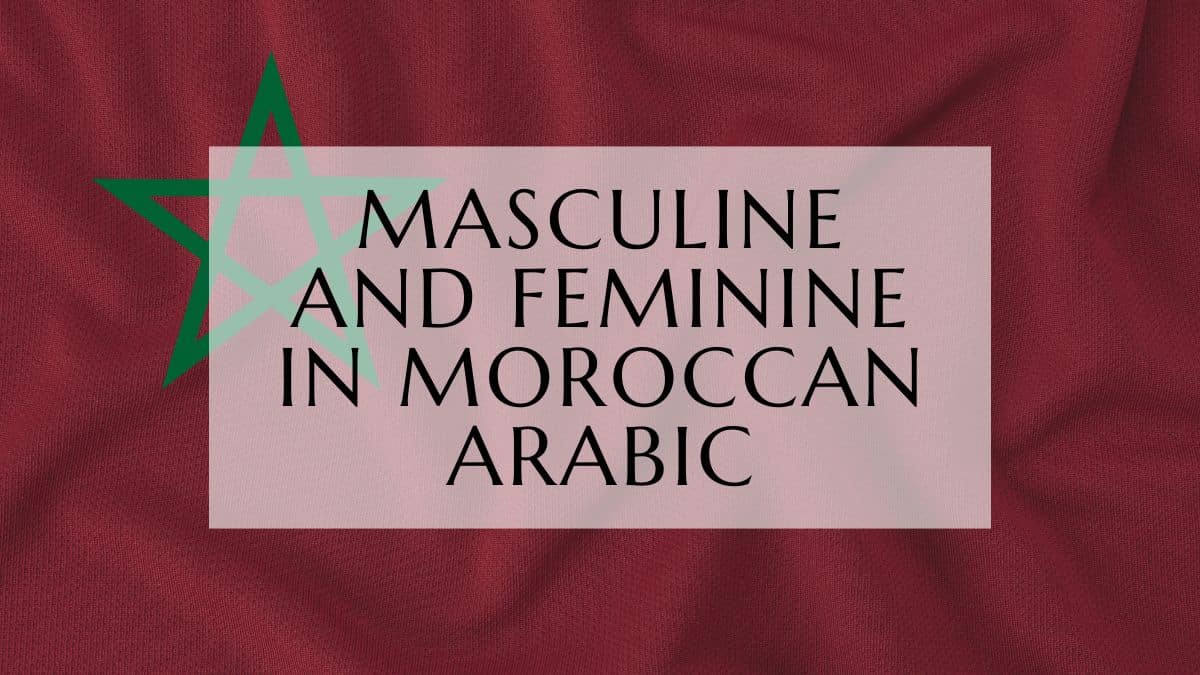
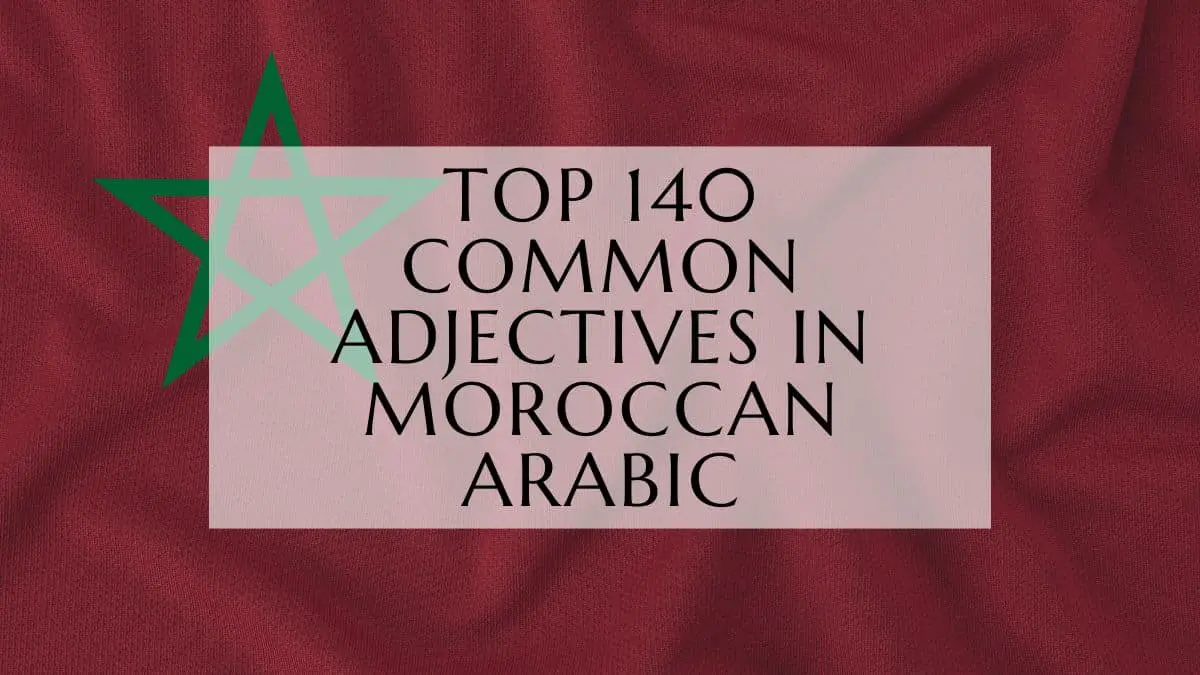
So much interesting, I love this guide! Thank you.
Shukran Larice! Happy learning!
I’m a brazilian girl who loves Morocco, I thought it was impossible to learn Moroccan Arabic until I found this site. Thank you!
Salam, enjoy learning!